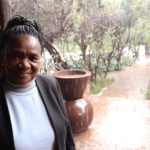© Copyright Bhekisisa Centre for Health Journalism | Privacy Policy | Terms and Conditions | PAIA Manual
Home Search
africa - search results
If you're not happy with the results, please do another search
[LISTEN] The anti-HIV jab is coming to SA. Find out when and how
Towards the end of the year, donated batches of the anti-HIV jab, CAB-LA, will arrive in South Africa. The two-monthly jab will be used in implementation trials and virtually wipes out someone’s chances of contracting HIV through sex. How much will donors and the South African health department have to pay for such injections and can the drugmaker, ViiV Healthcare, make enough of them? In this podcast, Mia Malan asks Mitchell Warren, who leads a group of organisations and donors who look at ways to make the jab available as fast as possible, for answers.
Why climate change is the biggest threat to health this century
The world is in a polycrisis — and climate change will highlight vulnerabilities and inequalities in healthcare. We need to understand how changing weather patterns will affect our health and draw on lessons from past research to help us become more resilient. Here’s what experts said at Bhekisisa’s 10th birthday celebration on Tuesday, 7 November.
Health Beat #13 | Why a hotter Earth could break health budgets
A hotter Earth is a threat to human health. It means more floods, droughts and heatwaves, which in turn make many diseases spread faster. Higher temperatures also exacerbate air pollution, resulting in more damage to our lungs. In this Health Beat episode we show you why climate change is our next pandemic.
We’ve come a long way, baby
On our 10th birthday, we’ve grown from a three-person health desk at the Mail & Guardian to an independent media organisation with a staff of 20 full and part-time employees. Today, we have an average of two million annual pageviews and we’ve expanded from print-only stories to television and podcasts. Want to know more? This seven-minute video has it all.
From Moshi to Moscow: How a girl from the slopes of Kilimanjaro became Tanzania’s...
In 1969, Esther Mwaikambo became Tanzania’s first female doctor. Today, she is arguably also the country’s most famous. She tells Sean Christie how public healthcare in Africa has changed — and what she wishes for the future.
#TeamBhekisisa | From 2013 to 2023: Here’s what’s in a day’s work for Bhekisisa...
Mia Malan founded Bhekisisa in 2013. Since then the centre’s staff has grown from 3 to 20 full and part-time employees. Here’s what she’s had to do to make this happen.
Dirty air & diabetes: Scientists say there’s a link
A seven-year study across 12 000 people in two Indian cities shows that breathing in dirty city air for as little as one month can raise blood sugar levels. After a year of this, people have a higher chance of getting type 2 diabetes.
Making the case: Why poor mental health flags the need for HIV testing
To help South Africa wipe out HIV by 2030, the country focuses on getting people who have a big chance of getting or spreading HIV access to testing and treatment. Researchers say that people with serious mental illnesses should be added to the list of these key populations in South Africa. Learn more.
[WATCH] Why a hotter Earth makes dirty air more dangerous
Doctors have told Khehla Mahlangu and Jeremiah Maseko that their lungs are no good. They’ve lived and worked in Secunda in Mpumalanga for many years, where factories have dirtied the air. And now climate change is worsening things.
Yes or no? Here’s what SA says sexual consent means
From kissing to final base, people have to say yes before you can go on. We asked people in South Africa what consent means to them, and what influences their decisions.
Over a million SAs have used the HIV prevention pill
More than a million public healthcare users in South Africa had started to use the HIV prevention pill by the end of May, with over half doing so in the past two years, health department data shows. But what must we do to make the pill — and a two-monthly HIV prevention injection — easier to get?
Should nurses be allowed to hand out psychiatric drugs?
People with HIV have a big chance of battling with mental health problems. At the moment though, only doctors can prescribe psychiatric medicines. Could getting nurses to do this too help people with HIV to stay on their treatment, and so get infection rates down? Mia Malan finds out from a doctor who’s lived through HIV with his patients for the past 20 years.
#BhekisisaDiaries: Why Zano Kunene writes rugby stories
From the pitch to print, health reporter Zano Kunene takes you on the journey of how his passion for sports led to writing on sports-related brain injuries.
The waiting game: Could SA’s poor policies be behind our organ donation crisis?
In South Africa, the demand for donor organs far outstrips the supply — not because people aren’t signing up for donation, but rather because there aren’t policies in place to manage the transplant chain. Spain, though, has managed to fix the problem in their country. Can we learn from them?
The fine line between wrong and almost right — and how that plays out...
What should journalists do when presidents say the wrong thing — report the story or bury it? A medical doctor, editor, Rhodes Scholar and New York City’s health commissioner during COVID take a deep dive.
A spritz in time could save nine: Should schools have anti-overdose drugs at hand?
To help keep kids safe from drug overdoses, lawmakers in the US state of Colorado say schools can have an anti-overdose medicine in their emergency kit — and are making it available cheaply or even for free. But not all schools are signing up. Here’s why.
![[LISTEN] The anti-HIV jab is coming to SA. Find out when and how](https://bhekisisa.org/wp-content/uploads/2023/11/6E2A0301-150x150.jpg)







![[WATCH] Why a hotter Earth makes dirty air more dangerous](https://bhekisisa.org/wp-content/uploads/2023/10/Coal-Station-150x150.jpg)






